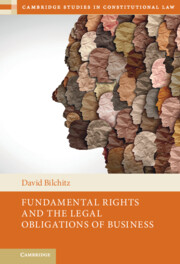Book contents
- Fundamental Rights and the Legal Obligations of Business
- Cambridge Studies in Constitutional Law
- Fundamental Rights and the Legal Obligations of Business
- Copyright page
- Dedication
- Contents
- Figures
- Tables
- Preface
- Acknowledgements
- Table of Cases
- Introduction The Question of Substantive Corporate Obligations for Fundamental Rights
- 1 The Nature and Purpose of the Corporation in Law
- Part I Legal Doctrinal Models for Addressing the Substantive Obligations of Non-State Actors for Fundamental Rights
- 2 The State Duty to Protect Model
- 3 The Indirect Application Model
- 4 The Expanding the State Model
- 5 The Direct Obligations Model
- Part II Towards a Multi-Factoral Approach for Determining the Substantive Content of Corporate Obligations
- Part III The Institutional Implications of the Multi-Factoral Approach
- Bibliography
- Index
5 - The Direct Obligations Model
from Part I - Legal Doctrinal Models for Addressing the Substantive Obligations of Non-State Actors for Fundamental Rights
Published online by Cambridge University Press: 29 October 2021
- Fundamental Rights and the Legal Obligations of Business
- Cambridge Studies in Constitutional Law
- Fundamental Rights and the Legal Obligations of Business
- Copyright page
- Dedication
- Contents
- Figures
- Tables
- Preface
- Acknowledgements
- Table of Cases
- Introduction The Question of Substantive Corporate Obligations for Fundamental Rights
- 1 The Nature and Purpose of the Corporation in Law
- Part I Legal Doctrinal Models for Addressing the Substantive Obligations of Non-State Actors for Fundamental Rights
- 2 The State Duty to Protect Model
- 3 The Indirect Application Model
- 4 The Expanding the State Model
- 5 The Direct Obligations Model
- Part II Towards a Multi-Factoral Approach for Determining the Substantive Content of Corporate Obligations
- Part III The Institutional Implications of the Multi-Factoral Approach
- Bibliography
- Index
Summary
This chapter examines the ‘direct obligations’ model which accepts that fundamental rights can impose legally binding obligations upon non-state actors. After briefly outlining the contours of this model, and its justification, I consider an important challenge, namely, whether recognising the obligations of non-state actors entails they have fundamental rights. At the international level, I consider the ‘sphere of influence’ approach and the ‘due diligence’ approach (enshrined in the UNGPs). I argue that the latter has an important normative gap at its core: understanding the impacts of a business on rights does not automatically translate into a conception of its obligations. The last part of this chapter considers two jurisdictions – South Africa and Colombia - and the principles they utilize to determine the direct obligations of non-state actors. Neither jurisdiction has articulated a clear legal analytical framework but what emerges is similar to the other models analysed and can form the building blocks of the multi-factoral approach developed in the following chapters.
Keywords
- Type
- Chapter
- Information
- Fundamental Rights and the Legal Obligations of Business , pp. 175 - 216Publisher: Cambridge University PressPrint publication year: 2021



